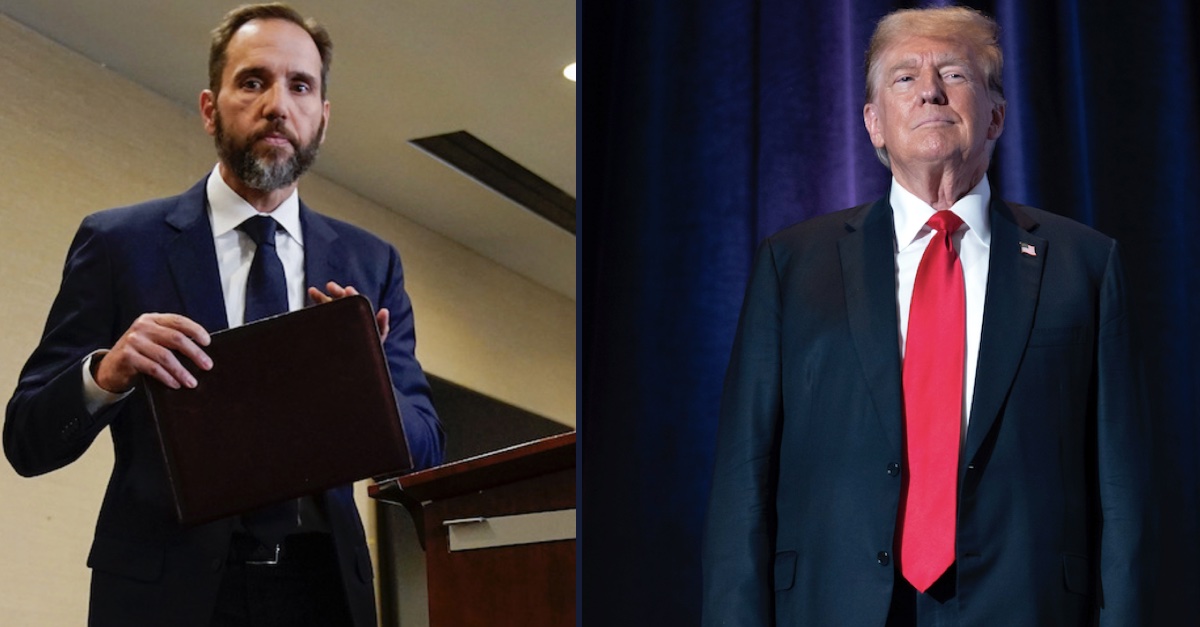
Left: Special counsel Jack Smith turns from the podium after speaking about an indictment of former President Donald Trump, Tuesday, Aug. 1, 2023, at a Department of Justice office in Washington (AP Photo/Jacquelyn Martin). Right: President-elect Donald Trump stands on stage at the Libertarian National Convention at the Washington Hilton in Washington, Saturday, May 25, 2024 (AP Photo/Jose Luis Magana).
Special counsel Jack Smith filed court documents on Monday to dismiss the criminal election interference case against President-elect Donald Trump before he takes office in January, citing long-standing Justice Department policy prohibiting the indictment and prosecution of a sitting president. The request was subsequently granted by U.S. District Judge Tanya Chutkan just a few hours after Smith’s filing, meaning the charges stemming from Trump’s alleged attempt to undermine the 2020 election on Jan. 6 are over.
While the dismissal was inevitable, Smith requested that the case against Trump be dismissed “without prejudice,” meaning there would be nothing barring prosecutors from bringing the same charges again in the future.
In her order granting the request, Chutkan wrote that “dismissal without prejudice is appropriate here,” noting that Trump’s presidential immunity from prosecution will not be permanent.
“Dismissal without prejudice is also consistent with the Government’s understanding that the immunity afforded to a sitting President is temporary, expiring when they leave office,” Chutkan wrote.
In the six-page motion to dismiss filed in Washington, D.C., federal court, Smith reiterated the DOJ’s policy before emphasizing that his hands were tied. He also emphasized that the department and the country “have never faced the circumstances here,” regarding a private citizen under indictment being elected to the highest office in the land.
“After careful consideration, the Department has determined that OLC’s [Office of Legal Counsel] prior opinions concerning the Constitution’s prohibition on federal indictment and prosecution of a sitting President apply to this situation and that as a result this prosecution must be dismissed before the defendant is inaugurated. That prohibition is categorical and does not turn on the gravity of the crimes charged, the strength of the Government’s proof, or the merits of the prosecution, which the Government stands fully behind. Based on the Department’s interpretation of the Constitution, the Government moves for dismissal without prejudice of the superseding indictment.”
Smith, appointed special counsel two years ago, has spearheaded two federal criminal investigations into Trump. One, in Florida, involving Trump’s alleged mishandling of classified documents following his first term in office, and another, in Washington, D.C., involving his alleged efforts to overturn the results of the 2020 presidential election.
In the D.C. case, Chutkan had been saddled with deciding what aspects of the initial indictment against Trump could remain in light of the U.S. Supreme Court’s sweeping ruling earlier this year that made a sitting president immune from prosecution for any official acts taken while in office. Additionally, evidence of a president’s official acts cannot be used against a president in a criminal case, even where the underlying conduct is personal in nature.
There’s not much chance that the case will result in concrete answers to the presidential immunity questions, as many expect Trump to pardon himself before leaving office.
In addition to seeking dismissal without prejudice, Smith’s memo repeatedly noted that Trump may not be entirely clear of legal trouble once his second stint in office ends.
“OLC explained that because a sitting President’s immunity is ‘temporary,’ extending only so far as his term in office, it ‘would not subvert the important interest in maintaining the ‘rule of law,”” the memo states, adding that such immunity “would generally result in the delay, but not the forbearance, of any criminal trial.”
The Florida document-hoarding case was dismissed in July by U.S. District Court Judge Aileen Cannon. The Trump-appointed judge reasoned that U.S. Attorney General Merrick Garland unlawfully appointed Smith. As a result, Cannon dismissed the classified documents prosecution, tying the special counsel’s case up in appeals until the election. Smith is similarly seeking to dismiss that case from the appellate court without prejudice.
However, Smith did ask that the court of appeals keep the case against Trump’s co-defendants, Walt Nauta and Carlos De Oliveira, indicating he plans to continue their prosecutions. Nauta and De Olivera have both pleaded not guilty to the election subversion charges.
As Law&Crime previously reported, Smith has reportedly told people involved with the investigation that he will be resigning before Trump takes office on Jan. 20.
Have a tip we should know? [email protected]








